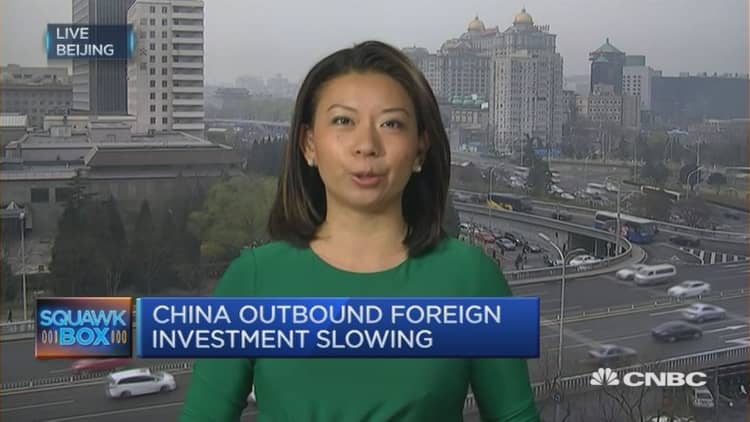
China's massive foreign shopping spree is finally slowing down because of tighter regulations.
So far this year, $25 billion in outbound deals from China has been announced, which is 70 percent less than the same period last year, according to Dealogic. And deal activity will be on the wane all year, experts said, because of increased regulatory scrutiny on foreign investment.
"The government is turning up its nose at these firms," said Benjamin Quinlan of financial consulting firm Quinlan and Associates. "Unless there is an imperative reason to do this, [it's saying] keep the money onshore, stop draining the current account and pushing funds out of China."
For years, Chinese companies were snapping up firms left and right. Outbound deals hit a new record every year since 2009, soaring more than 500 percent to a whopping $226.5 billion last year, according to Dealogic.
The buying frenzy meant money was flying out of China, weakening an already depreciating yuan. To counterbalance, China burned through $1 billion of its foreign exchange reserves since mid-2014 to buy back yuan.
For some time, it appeared the government felt things were under control, said China economist Julian Evans-Pritchard of Capital Economics.
But then, "Trump was elected, and we had this very sharp jump on the dollar," he said. "I think that kind of spooked [China] a little bit, and hence a couple of weeks later, we got capital controls on outbound investment."
Late last year, the government increased regulatory scrutiny on specific transactions, including deals over $10 billion, property investments more than $1 billion by state-owned firms, ones over $1 billion unrelated to a company's core area of business, and investments in overseas listed Chinese firms, according to the Rhodium Group.
That came after Beijing had already tightened checks on currency conversions, delaying a number of deals. Pan Gongsheng, the head China's State Administration of Foreign Exchange, has also warned against overseas mergers, recently calling them a "rose with thorns" in a state media report.
On the ground, acquisitions have unraveled and others are on the rocks. The biggest transaction withdrawn last year was Anbang Insurance's $15.5 billion bid for Starwood Hotels, based on Dealogic data.
Earlier this month, Chinese conglomerate Dalian Wanda's $1 billion deal to buy Dick Clark Productions, which runs the Golden Globe awards, also fell through. And a bid by a Chinese investor group to buy Italy's AC Milan football club remains stalled.
From now on, forget about seeing the "big ticket items," said Dealogic's Chunsek Chan. He said it's unlikely a deal like ChemChina's $43 billion purchase for Syngenta — the largest ever overseas acquisition by a Chinese company — will happen again.
Smaller deals that align with Beijing's strategic interests — for instance, shoring up access to resources or tech buys — have a better chance of going through, Chan said.
But experts say the government's move is a temporary solution, as it doesn't address ongoing interest by Chinese investors to move money abroad, and complicates longer-term reform efforts to loosen Beijing's grip on the yuan.
There is "still pressure for money to move out of the country as the Chinese economy slows, and especially as markets like the U.S. have gained steam," said Quinlan.


